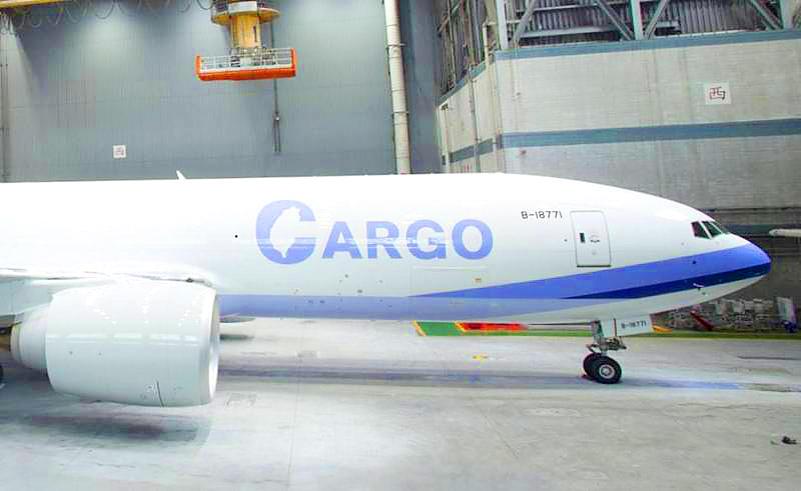The Ministry of Transportation and Communications has shelved a long-term plan to change the name of China Airlines (CAL) due to the difficulties that the airline has encountered when dispatching cargo planes decorated with Taiwanese images, Minister of Transportation and Communications Wang Kwo-tsai (王國材) told a meeting of the legislature’s Transportation Committee yesterday.
“In the short and medium term, we will ensure that the airline’s cargo planes have no trouble flying to other countries and that people will not mistake it for a Chinese airline,” Wang told lawmakers.
Although discussions about changing the name of the nation’s largest international carrier have been ongoing for more than a decade, it gathered steam again in 2020 when China Airlines delivered masks donated by Taiwan to countries affected by the COVID-19 pandemic.

Photo courtesy of China Airlines
Several European news media outlets published photographs of the China Airlines’ cargo flights, but incorrectly identified the donations as coming from China.
The committee that year passed a motion asking the ministry, which owns 31 percent of China Airlines shares, to showcase Taiwanese images on its aircraft’s fuselage.
In December 2020, the airline presented a new fuselage design for its Boeing 777 cargo jets. The word “Cargo” was painted near the front of the aircraft, with the letter “C” shaped around a map of Taiwan.
The words “China Airlines” were significantly reduced in size and moved near the tail of the plane, with a plum blossom, the national flower, painted on the vertical stabilizer.
However, it was discovered that the map of Taiwan has been removed from the letter “C” on a new Boeing 777 cargo jet that arrived at the end of last month.
Premier Su Tseng-chang (蘇貞昌) told lawmakers in a plenary session last week that the cargo plane with the Taiwanese map fuselage design had been denied entry to airports in China, Hong Kong and Macau.
Chinese Nationalist Party (KMT) Legislator Lu Ming-che (魯明哲) asked China Airlines president Kao Shing-hwang (高星潢) if the company still insists on meeting its long-term goal of changing its name given the problems that such a small change in the fuselage design has engendered.
Democratic Progressive Party Legislator Lin Chun-hsien (林俊憲) said the government should consider using EVA Airways’ cargo jets to deliver materials donated to other countries, so people would not misidentify them as Chinese airplanes.
“Taiwan has donated aid to Ukrainian refugees in Europe, but people would never know the love and care of Taiwanese because they would think it was delivered by a Chinese airline,” Lin said, adding that China Airlines needs to address the issue to avoid confusion.
Kao told the committee that China Airlines, as a publicly traded firm, is obligated to protect its shareholders.
“The airline can only survive if its aircraft can fly to other countries. We will take all factors into consideration” when considering a new fuselage design, he said.
Changing the name of the airline is no small matter, as it involves applying for a new code with the International Civil Aviation Organization, Wang told reporters on the sidelines of the committee meeting.
Cargo jets featuring a map of Taiwan would be used to deliver goods to countries in North America, Wang said.
“Changing the name of China Airlines is a long-term goal. In the short term, we need to strike a balance between avoiding confusion and continuing flight services,” he said.

Taiwanese can file complaints with the Tourism Administration to report travel agencies if their activities caused termination of a person’s citizenship, Mainland Affairs Council Minister Chiu Chui-cheng (邱垂正) said yesterday, after a podcaster highlighted a case in which a person’s citizenship was canceled for receiving a single-use Chinese passport to enter Russia. The council is aware of incidents in which people who signed up through Chinese travel agencies for tours of Russia were told they could obtain Russian visas and fast-track border clearance, Chiu told reporters on the sidelines of an event in Taipei. However, the travel agencies actually applied

New measures aimed at making Taiwan more attractive to foreign professionals came into effect this month, the National Development Council said yesterday. Among the changes, international students at Taiwanese universities would be able to work in Taiwan without a work permit in the two years after they graduate, explainer materials provided by the council said. In addition, foreign nationals who graduated from one of the world’s top 200 universities within the past five years can also apply for a two-year open work permit. Previously, those graduates would have needed to apply for a work permit using point-based criteria or have a Taiwanese company

The Shilin District Prosecutors’ Office yesterday indicted two Taiwanese and issued a wanted notice for Pete Liu (劉作虎), founder of Shenzhen-based smartphone manufacturer OnePlus Technology Co (萬普拉斯科技), for allegedly contravening the Act Governing Relations Between the People of the Taiwan Area and the Mainland Area (臺灣地區與大陸地區人民關係條例) by poaching 70 engineers in Taiwan. Liu allegedly traveled to Taiwan at the end of 2014 and met with a Taiwanese man surnamed Lin (林) to discuss establishing a mobile software research and development (R&D) team in Taiwan, prosecutors said. Without approval from the government, Lin, following Liu’s instructions, recruited more than 70 software

BACK TO WINTER: A strong continental cold air mass would move south on Tuesday next week, bringing colder temperatures to northern and central Taiwan A tropical depression east of the Philippines could soon be upgraded to be the first tropical storm of this year, the Central Weather Administration (CWA) said yesterday, adding that the next cold air mass is forecast to arrive on Monday next week. CWA forecaster Cheng Jie-ren (鄭傑仁) said the first tropical depression of this year is over waters east of the Philippines, about 1,867km southeast of Oluanpi (鵝鑾鼻), and could strengthen into Tropical Storm Nokaen by early today. The system is moving slowly from northwest to north, and is expected to remain east of the Philippines with little chance of affecting Taiwan,